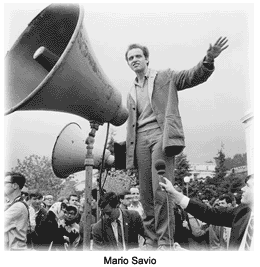Often said to be the start of student protest movements during the 1960s and 1970s, the Free Speech Movement (FSM) brought together University of California, Berkeley, students, teaching assistants, and faculty members to protest against the university`s ban on political activities, and to establish the right to express their political views on campus.
 More than 800 protestors were arrested during a strike on December 4, 1964, in an attempt to persuade the university to intercede in the court proceedings of FSM`s leader Mario Savio, who had been jailed after a meeting held at the Greek Theater for students, faculty, and adminstrators to discuss proposals to end the campus-wide confrontation.
Slowly, the U.C. Board of Regents backed down and on January 2, 1965, new acting chancellor Martin Meyerson, who had supported the FSM, assented to most of the movement`s fundamental demands.
Students were once again allowed to set up tables in Sproul Plaza and other places on campus where students could receive donations, distribute literature, recruit members, and sell such political items as buttons, pins, and bumper stickers. Students also were permitted to hold protests and marches for a variety of political, religious, and social issues.
Mario Savio once explained why it had seemed to important to challenge the university at considerable risks to the students` own futures. He said, "I spent the summer in Mississippi. I witnessed tyranny. I saw groups of men in the minority working their wills over the majority. Then I came back here and found the university preventing us from collecting money for use there and even stopping us from getting people to go to Mississippi to help."
More than 800 protestors were arrested during a strike on December 4, 1964, in an attempt to persuade the university to intercede in the court proceedings of FSM`s leader Mario Savio, who had been jailed after a meeting held at the Greek Theater for students, faculty, and adminstrators to discuss proposals to end the campus-wide confrontation.
Slowly, the U.C. Board of Regents backed down and on January 2, 1965, new acting chancellor Martin Meyerson, who had supported the FSM, assented to most of the movement`s fundamental demands.
Students were once again allowed to set up tables in Sproul Plaza and other places on campus where students could receive donations, distribute literature, recruit members, and sell such political items as buttons, pins, and bumper stickers. Students also were permitted to hold protests and marches for a variety of political, religious, and social issues.
Mario Savio once explained why it had seemed to important to challenge the university at considerable risks to the students` own futures. He said, "I spent the summer in Mississippi. I witnessed tyranny. I saw groups of men in the minority working their wills over the majority. Then I came back here and found the university preventing us from collecting money for use there and even stopping us from getting people to go to Mississippi to help."